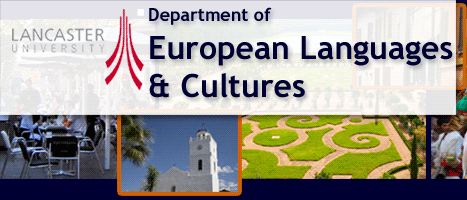
NEWS AND EVENTS ARCHIVE (2009-2014)
Archive
Hermann Broch's 'Sleepwalkers'-Trilogy: Interpretation and Reception
Date: 3-5 July 2009 Time: Friday 2.00 pm - Sunday 2.00 pm
Venue: University Conference Centre
Lancaster Broch Symposium
Hermann Broch's 'Sleepwalkers'-Trilogy: Interpretation and Reception
The Austrian writer Hermann Broch (1886-1951), acclaimed by the critic George Steiner as 'the greatest novelist European literature has produced since Joyce', is a key figure in 20th-century modernism, to be ranked alongside his contemporaries Thomas Mann and Robert Musil. His significance, primarily grounded in his two major fictions, the trilogy The Sleepwalkers (1929-32) and The Death of Virgil (1945), extends into the fields of aesthetics, cultural criticism, philosophy, mass psychology, and political theory: areas to which he devoted a considerable part of his life as an intellectual and a considerable portion of his published writings. Linking the two spheres of literary and theoretical creativity was a lifelong attempt to understand what he perceived as the crisis of western European values. His formulations of this crisis -- 'The loss of the absolute' 'The disintegration of values' -- bear the hallmark of central European modernist concerns, but nonetheless raise issues that are still acutely pertinent today, with the sharpening of conflicts between religious and secular value systems, and continuing debates on the issue of moral relativism (now seen as 'postmodern') in a newly globalised context.
Recent annual symposia organised under the aegis of the International Hermann Broch Working Group (http://artsci.wustl.edu/~iab/symposien.htm) have largely been devoted to the exploration of different dimensions of the writer's theoretical/cultural-critical reach, e.g. 'Hermann Broch and the arts' (Prague, June 2008); 'Hermann Broch's quest for a new religion' (Strasbourg, June 2007). The Lancaster Symposium 2009 on the other hand recognises that the time is ripe for a multi-faceted reassessment of what is in many critics' estimation the pinnacle of Broch's literary oeuvre, the Sleepwalkers trilogy. Accordingly this work, its impact and its cultural-theoretical ramifications form the central focus of the conference. Conceived and executed in the late 1920s and early 1930s, the 3-volume novel brings Broch's powerful literary imagination to bear on the multi-layered historical and cultural crisis of his time, constructing its development over a 30-year time-frame 1888 - 1918.
A key question to be addressed in the opening and closing sessions of the Conference is that of the resonance of the trilogy's articulation of crisis, both in the era in which it appeared and in the similarly crisis-dominated discourse of today. The opening session in particular will examine aspects of the trilogy's reception. Linking the subsequent thematic sessions -- on aspects of the novel's narrative technique, symbolisations of the feminine, constructions of space and the body - will be an exploration of the complex relationship between the novel's modernist conception and its prefiguration of the postmodern: a theme that will then be opened up more fully in the session 'Ethics and Experience between modernism and postmodernism' that concludes the symposium.
OUTLINE PROGRAMME
FRIDAY 3 JULY
14.00 - 15.30 ARRIVAL AND REGISTRATION (University Conference Centre)
15.00 - 15.30 Coffee/Tea (Conference Centre Foyer)
15.30 Welcome by Dean of Faculty of Arts and Social Sciences
15.45 Session 1 Die Schlafwandler: Reception and Impact 1930s - the present
Paul Michael Lützeler (St Louis, Missouri): Opening address
Graham Bartram (Lancaster): Die Schlafwandler: The 1930s critical response
Ester Saletta (Bergamo): 'Ich habe keine Idee mehr. Ich habe nur Gedächtnis.' Brochs Schlafwandler-Trilogie in Michelangelo Antonionis neorealistischer dreiteiliger Filmbearbeitung La notte, L'avventura, L'eclisse
Discussion
18.00 Wine reception
19.00 - 20.00 Dinner (Langdales, County South)
SATURDAY 4 JULY
08.00 - 09.00 Breakfast (Langdales, County South)
9.15 Session 2: Narrative technique in the era of classical modernism
Elizabeth Guilhamon (Bordeaux): Pasenows Ironie in Hermann Brochs Schlafwandler-Trilogie
Robert Halsall (Aberdeen): Authorship and Indirection in Broch's Sleepwalkers
10.30 - 11.00 Coffee/Tea (Conference Centre Foyer)
11.00 Session 3: Female experience vs the feminine 'other'
Gisela Brude-Firnau (Waterloo): Hermann Broch - Otto Weininger: K/ein Mythos der Selbsterlösung
Sarah McGaughey (Dickinson College): House in Roses or Urban Apartment: Women and the Modern Interior in Hermann Broch's Schlafwandler
12.00 Discussion
12.30 - 13.30 Lunch (Conference Centre Foyer)
13.45 - 16.30 Optional Visit to Lancaster (Castle and Music Room)
16.30 Session 4: Constructions of Space and the Body
Duncan Large (Swansea): Pasenow's Uniform
17.00 Discussion
17.30 Session 5: Ethics and experience between modernism and postmodernism; Broch's novel as a performance of the crisis of values
Stephen Dowden (Brandeis): The problem of experience in Die Schlafwandler
19.30 for 20.00 Dinner: Lancaster House Hotel
SUNDAY 5 JULY
08.00 - 09.00 Breakfast (Langdales, County South)
9.15 Session 5 (continued)
Galin Tihanov (Manchester): Interrogating Modernity: 'Romantik' in Die Schlafwandler
Doren Wohlleben (Erlangen/Augsburg): Dramatische Phantasie. Handeln und Handlung bei Leo Perutz und Hermann Broch
10.15 Discussion
10.30 - 11.00 Coffee/Tea
11.00 Wolfgang Müller-Funk (Vienna): Der Roman als mediales Genre kultureller Erkundung: Werte und Konstruktionsformen im Zeitalter einer krisenhaften Moderne in Hermann Brochs Trilogie Die Schlafwandler
11.30 Discussion
11.45 IAB Discussion
13.00 Lunch (Conference Centre Foyer)
DEPARTURE
Contact:
Who can attend: Anyone
Further information
Associated staff:
Organising departments and research centres: European Languages and Cultures
Keyword: